Pic: David Lidington makes Prime Minister's Questions debutpublished at 12:05 GMT 7 December 2016
Leader of the Commons is standing in for Theresa May
 House of Commons
House of Commons
Parliament
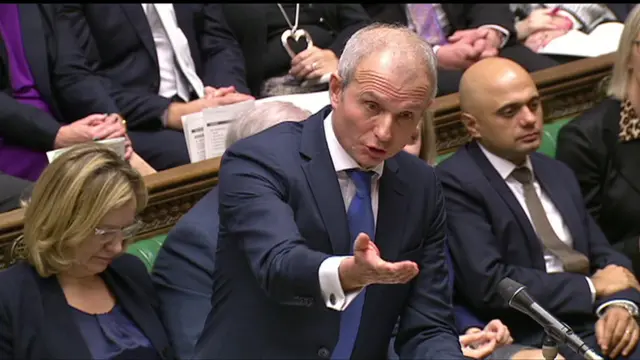 Image source, HoC
Image source, HoCMr Lidington is taking PMQs while Mrs May is abroad
Supreme Court case ends with reminder it's not about stopping Brexit
Government appealed against ruling it needs MPs' approval to trigger Brexit
Judgement is expected in January
Watch highlights of each day via clips above, or scroll down to see how events unfolded
Jackie Storer and Alex Hunt
Leader of the Commons is standing in for Theresa May
 House of Commons
House of Commons
Parliament
 Image source, HoC
Image source, HoCMr Lidington is taking PMQs while Mrs May is abroad
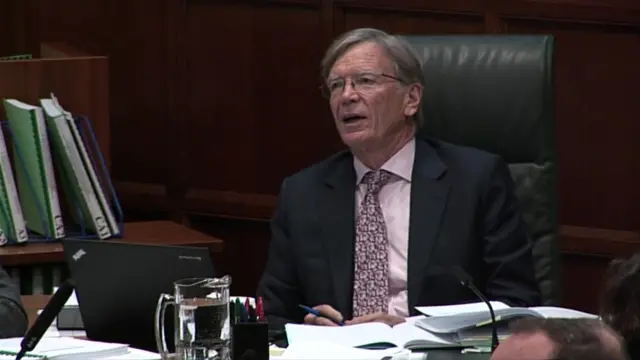 Image source, Supreme Court
Image source, Supreme CourtLord Carnwath intervenes to tell "Mr Pannick that he would like to get a word in edgeways" and steer the discussion to the 2008 Lisbon Treaty, which created Article 50.
The Supreme Court justice is gently reminded by an aide that the lawyer is also a peer of the realm.
Interestingly, Lord Pannick makes the same appeal to the justices as his opposite number - government lawyer James Eadie - did yesterday.
In layman's terms, he urges them not to stray beyond their brief and rather than merely interpreting the existing law, effectively create new law.
Quote MessageWhat the court cannot do is somehow infer from the general context, a purpose, intention or effect that has no support whatsoever in the language. That is creation, that would be, in my submission, objectionable to judicial lawmaking."
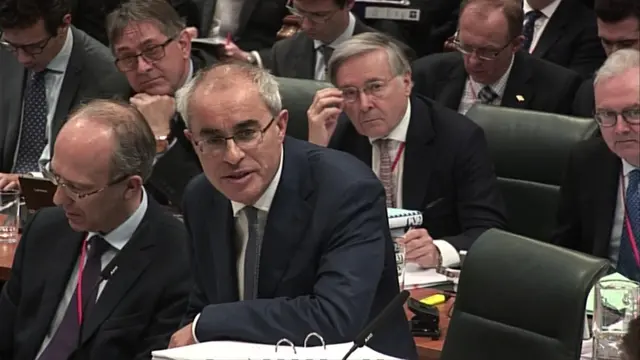 Image source, Supreme Court
Image source, Supreme CourtLord Reed is talking about the 2015 Referendum Act, which authorised this year's EU vote, saying that it was a different kind of law in that it did not create a body of rights and obligations but ushered in a major political event.
Lord Pannick says he does not deny the Act's "political significance" but he maintains it said nothing about the government's executive powers and the "division of responsibility" between the executive and legislature and in no way conferred new authority on the government.
He advises the court against "inferring matters not addressed in the act", saying on a matter of such sensitivity this would be "fundamentally wrong".
Quote MessageIt was open to Parliament, if it wished to do so, to say whatever it liked on this topic and it said absolutely nothing.
Lord Pannick goes onto to say only a new act of Parliament, not a simple motion, would give the government the authority to trigger Article 50.
Quote MessageThe law of the land is not altered by a motion in Parliament. This is a basic constitutional principle. The court knows a motion maybe approved in the House of Commons today, I want to be very clear on this, our submission is that a motion in Parliament does not affect, cannot affect, the legal issues in this case."
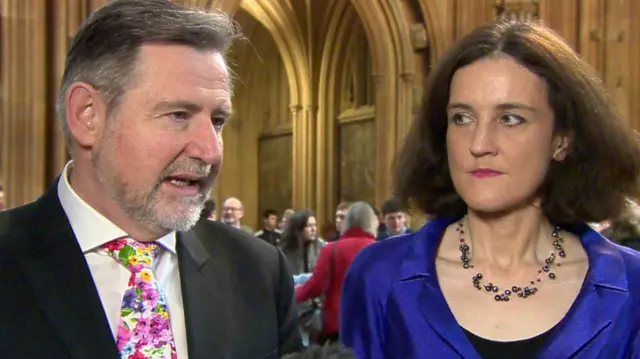
Away from the courtroom, MPs are gearing up for PMQs at noon and thoughts are turning to Labour's demands for a detailed plan of the government strategy for leaving the EU. Labour MP Barry Gardiner, the shadow international trade secretary, tells the BBC's assistant political editor Norman Smith it's "very easy to turn today into who's winning, who's losing", but we "will all be happy" if we get a good plan which sets out the objectives of negotiations and a timetable for implementation.
He says the most comprehensive way to do this would be in a White Paper. But Downing Street has already ruled that out, our correspondent points out.
Conservative MP Theresa Villiers, a former cabinet minister, is asked what a red, white and blue Brexit means. "Leaving the customs union and the single market," she replies.
She's confident that even if the Supreme Court goes against the government, Theresa May could still get a Bill through Parliament in time to stick to the current timetable to trigger Article 50 in March.
Allow X content?
This article contains content provided by X. We ask for your permission before anything is loaded, as they may be using cookies and other technologies. You may want to read X’s cookie policy, external and privacy policy, external before accepting. To view this content choose ‘accept and continue’.
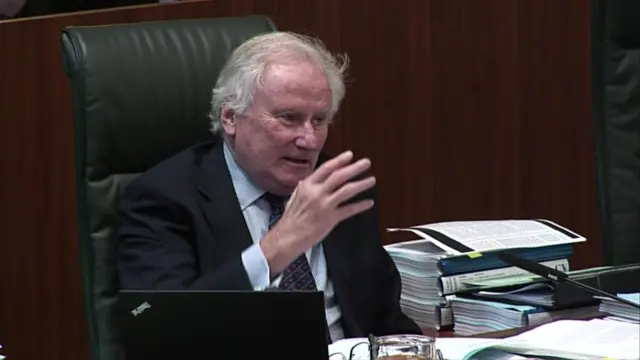 Image source, Supreme Court
Image source, Supreme CourtSome of the language being used here is getting rather painful.
Lord Kerr, one of the 11 justices, says talk about whether a clamp or a fetter was placed on the government's prerogative powers shows the "danger of metaphors" - since it begs the question of how such an imposition would be removed and what constitutional implications that would have.
Lord Pannick, who is challenging the government, seems to agree that things have got a bit esoteric, saying it is not so much a question of a clamp on the executive's actions as the "application of the fundamental constitutional principles of the UK".
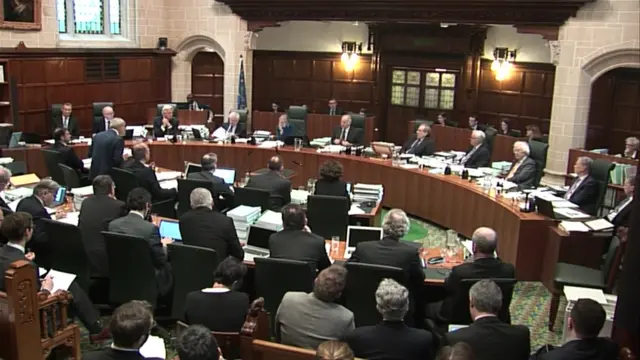 Image source, Supreme Court
Image source, Supreme CourtLord Pannick, who is arguing against the government, has moved on to the use of the royal prerogative in international affairs and its relevance to EU exit.
He makes clear that any changes to domestic law which arise from changes to international treaties would require primary legislation in Parliament.
In passing, he refers to the Ponsonby Rule - a constitutional convention that dictated that most international treaties had to be laid before Parliament 21 days before ratification - which he notes is "very familiar" to the justices.
Lord Mance intervenes to say that Lord Pannick is arguing that the use of the prerogative in this area was effectively "abolished or eliminated" by the passage of the European Communities Act by Parliament.
However, he wonders whether in fact court judgements on the issue may have found that it was "merely suppressed" and was "capable of being revived" arguing "closer study" of the language of the 1972 Act may be needed.
Lord Neuberger follows up, saying that the justices had to spend a lot of time looking at the 1972 Act to "persuade ourselves" that the prerogative had been, in his words, been "put into abeyance" by it.
He believes the argument that the 1972 Act merely put a temporary "clamp" on the prerogative and that the 2015 Referendum Act - which authorised last year's referendum - had "relaxed" it may have some force.
Quote MessageOne could say it is Parliament ceding the ground, so far as its role is concerned, to the people to a referendum. It has done that and then it is over to the government
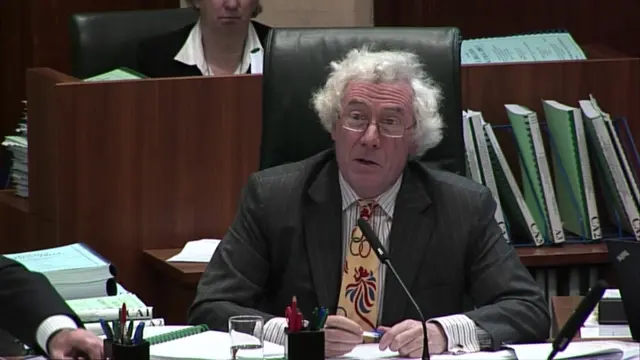 Image source, Supreme Court
Image source, Supreme CourtA large number of laws would be "rendered insensible" by the UK notifying the EU of its intention to leave, says Lord Pannick and this cannot be justified on the basis of the exercise of royal prerogative alone.
However, if this was preceeded by parliamentary authorisation, he says it would be "exceptional difficult" to argue that there remained any "legal impediment" to the government serving notice of its intention to leave.
And Parliament, he says, would be told that "all problems" regarding individual laws with an EU dimension - such as the 2003 Communications Act - would be dealt with before the actual day the UK left.
But Lord Sumption raises the possibility of laws such as this remaining on the statute book although their authority had effectively disappeared.
This will look "very strange until Parliament gets around to repealing it," he tells the court.
Quote MessageTechnically the position is, if notice is served and we subsequently left the EU, this would remain in force - absurd though that is. No doubt that explains in practice why it would be changed."
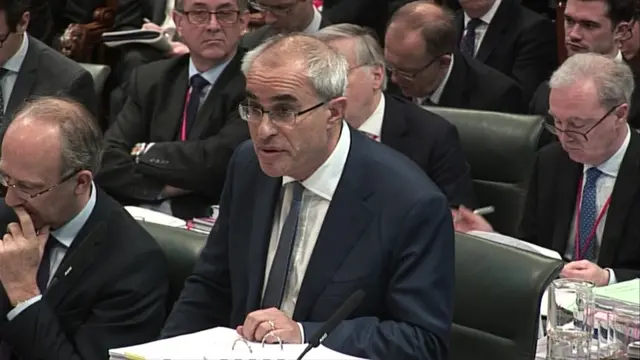 Image source, Supreme Court
Image source, Supreme CourtLord Pannick, who is putting the case for Parliament to have to be consulted before Article 50 is triggered, says it is not only the 1972 European Communities Act, which paved the way for the UK to join the then European Economic Community, which would be "frustrated" - that is legalese for being nullified - by triggering Article 50.
He tells the court there are "hundreds of statutes covering vast areas of national life" which are under threat from leaving the EU, including petition law, community law, equality law and communications law.
Specifically, he raises the 2002 European Parliament Elections Act and the 2003 Communications Act, which set out the remit of telecoms regulator Ofcom.
Former attorney general Dominic Grieve has said parliament has a "responsibility" to monitor Brexit negotiations "without interfering in their detail".
The Conservative MP told BBC Radio 4's The World Tonight on Tuesday that Michel Barnier's time frame of 18 months would be "difficult to achieve" but it may be possible with "goodwill on all sides".
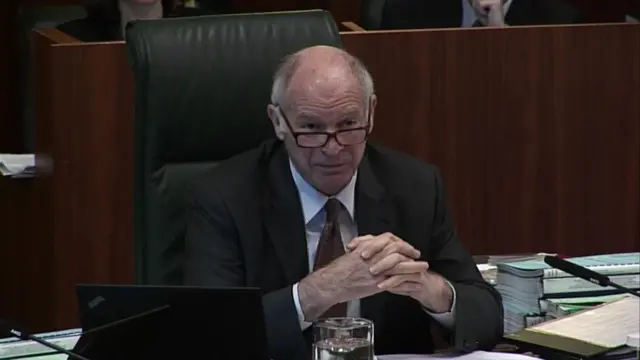 Image source, Supreme Court
Image source, Supreme CourtIt is a big day for leader of the House of Commons David Lidington - who is representing the government at PMQs later.
Now he gets a mention in the court as Lord Pannick makes reference to remarks Mr Lidington made in the Commons when he was Europe minister - saying they should be heeded, while not having a direct bearing on the Article 50 argument.
Council president Lord Neuberger, however, has a bit of concern about taking anything said in Parliament as an example of cause and effect, suggesting that this could be a "treacherous course".
Quote MessageThe only trouble is what a minister or somebody else says does not represent the reason why people vote or what they belief when they vote. It is like going into what people say about their contracts... that way madness can be said to lie because you start looking at everything said in Parliament."
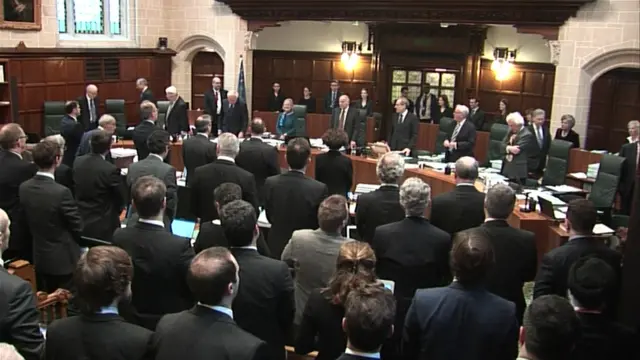 Image source, Supreme Court
Image source, Supreme CourtThe justices enter the courtroom and Lord Pannick takes the floor, noting that he was in the middle of his fourth key argument when the hearing was adjourned.
Lord Pannick makes an early reference to the ruling of the divisional court.
This is the High Court ruling last month which backed the legal challenge against the government's plan to trigger Brexit without the prior authorisation of Parliament.
We are about to get under way again. If this was a four-day Test match (and I know there are no such things... yet), this is the morning session on day three.
Lord Pannick is in his seat and we will be hearing from him shortly.
Independent columnist tweets...
Allow X content?
This article contains content provided by X. We ask for your permission before anything is loaded, as they may be using cookies and other technologies. You may want to read X’s cookie policy, external and privacy policy, external before accepting. To view this content choose ‘accept and continue’.
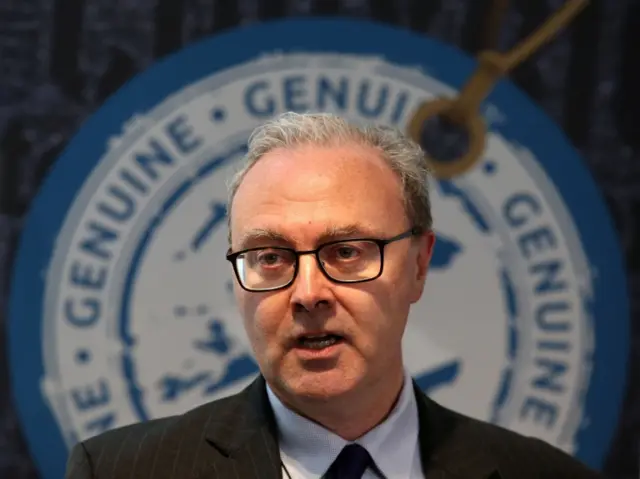 Image source, PA
Image source, PAA little more on Lord Wolffe's appearance before the court later.
The QC only became the Lord Advocate, the Scottish government's chief legal officer and prosecutor, this summer so this is quite a big moment for him.
The Edinburgh and Oxford educated lawyer, who was previously dean of the Faculty of Advocates, is expected to argue that Holyrood needs to be consulted before the UK can begin the formal process of leaving the EU.
In his written submission, external, he argued that the UK's exit from the EU would "change the competence" of the Scottish government and Parliament.
The UK government wants to start the process for leaving the European Union by using existing ministerial powers - the royal prerogative. Read more
Lord Wolffe's UK government counterpart argued on Tuesday that the consent of Holyrood and Westminster was not necessary.
 Image source, Various
Image source, VariousAway from the Supreme Court, it's a Wednesday so it must be Prime Minister's Questions at noon.
But it won't quite be PMQs as usual. Theresa May is on a visit to Bahrain so David Lidington, the leader of the House of Commons will be deputising for her for the first time.
It is his debut in the bearpit of PMQs but Mr Lidington is a former Europe minister so he should know his way around Brexit if it comes up during the session.
As for Labour, the questions will be asked by shadow foreign secretary Emily Thornberry, who is also having her first go at it.
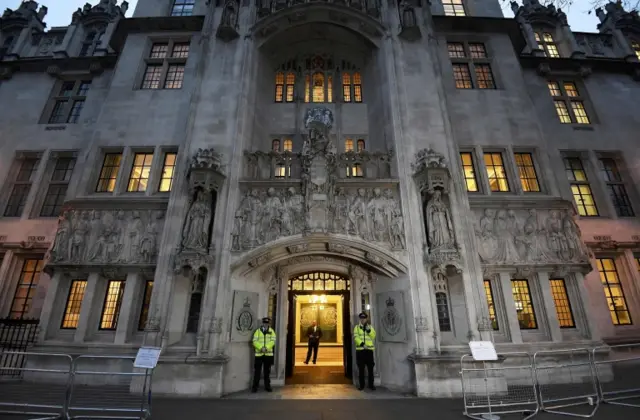 Image source, Reuters
Image source, ReutersWe've reached the half-way mark in the Supreme Court hearing.
The cast should be becoming quite familiar to you by now although Lord Sumption, one of the 11 Supreme Court justices, is certainly keeping us guessing with his colourful array of ties.
At 10:30 GMT, we will start where we left off on Tuesday with David Pannick, counsel for Gina Miller, explaining why he believes the government is wrong and why last month's High Court ruling stating that only Parliament can authorise the Brexit process should be upheld.
He set out seven key arguments yesterday and he is expected to elaborate on a number of those for a further 90 minutes.
After that we will hear from lawyers for the other respondent, hairdresser Deir Tozetti Dos Santos - led by QC Dominic Chambers.
Mr Dos Santos is making essentially the same argument as Ms Miller - that Parliament must give its consent before official Brexit talks can begin - although he has had a lower profile in the media in the past few months.
There will be a shift of direction in the afternoon, where attention will focus on Nothern Ireland and Scotland.
The court is hearing, in parallel, two other challenges to the government from Northern Irish campaigners Raymond McCord and Steven Agnew and their lawyers will be making representations on their behalf.
Finally, the Lord Advocate of Scotland will take the floor at about 15.15 GMT.
Lord Wolffe's appearance could be very interesting as he is representing the Scottish government - which wants to be consulted over the triggering of Article 50 and has been at loggerheads with the UK government over the whole issue of Brexit.
Scotland voted to remain in the EU and the UK's exit, the SNP argues, could have a profound impact not only on Scotland's place in the world but its future status in the United Kingdom.
Lawyers for campaigner Raymond McCord and NI anti-Brexit politicians are due to join case.
Read More BBC Breakfast
BBC Breakfast
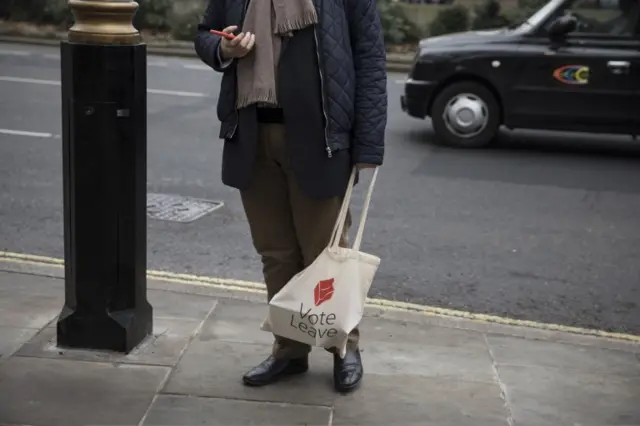 Image source, Getty Images
Image source, Getty ImagesLabour's shadow Brexit secretary Keir Starmer says the sooner the Supreme Court hearing is over "the better".
He tells BBC Breakfast that the government has effectively wasted two months by appealing against the High Court ruling which it lost, arguing "we could be well beyond where we are now" if Theresa May had simply accepted the ruling and asked Parliament to approve legislation on Article 50.
On the broader issue of Brexit, he says the 18-month timeframe for negotiations set out by the European Commission's chief negotiator Michel Barnier was "very tight" and the UK may have to agree to transitional arrangements.
He says the government must hit the ground running after it triggers Article 50 and while there is a level of detail he would not expect it to reveal, it was always going to have to say more about its over-arching objectives.